By Leen Randell
Updated: Jul 04, 2024
10 Best Herbal Decoctions For Gas In Stomach
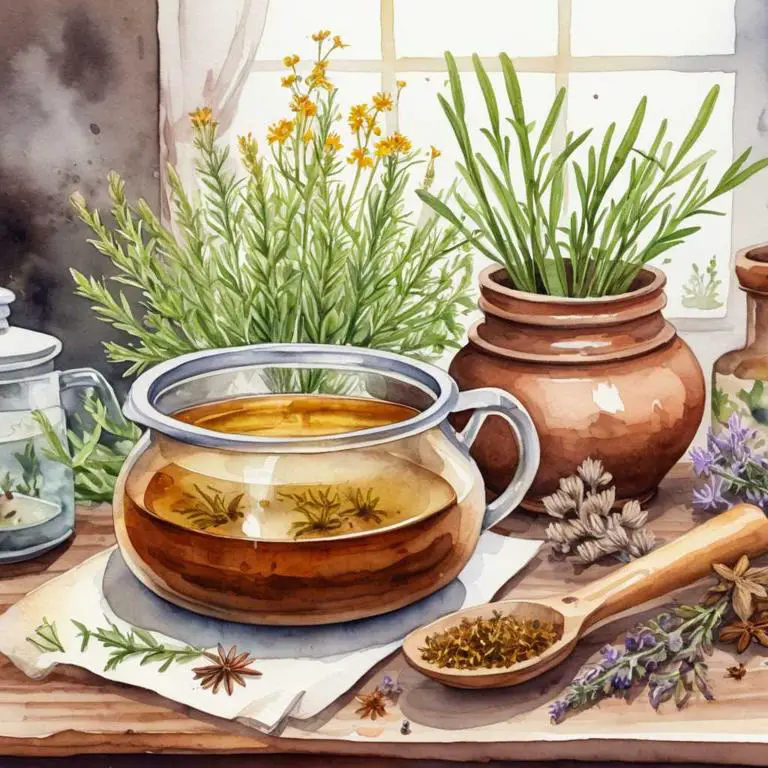
Herbal decoctions for gas in stomach are natural remedies made by steeping herbs in hot water to create a soothing liquid extract.
They help alleviate gas in the stomach by reducing inflammation, calming digestive issues, and improving digestion. Examples of herbal decoctions that help with gas include peppermint, ginger, and fennel tea, which can be consumed after meals to ease bloating and discomfort. By using these decoctions, individuals can enjoy improved digestion, reduced discomfort, and a sense of relief from symptoms like bloating and cramps.
This can significantly improve daily life by allowing for increased mobility and confidence in social situations.
The following article describes in detail the most important decoctions for gas in stomach, including medicinal properties, parts of herbs to use, and recipes for preparations.
- 1. Foeniculum vulgare
- 2. Glycyrrhiza glabra
- 3. Carum carvi
- 4. Angelica archangelica
- 5. Citrus x limon
- 6. Silybum marianum
- 7. Symphytum officinale
- 8. Taraxacum officinale
- 9. Aloe vera
- 10. Curcuma longa
- What is the best combination of herbal decoctions to use for gas in stomach?
- What ailments similar to gas in stomach are treated with herbal decoctions?
1. Foeniculum vulgare
Fennel decoctions helps with gas in stomach because it contains a compound called anethole, which has natural carminative properties that help to relax the muscles in the digestive tract and reduce bloating.
Additionally, fennel's anti-inflammatory properties can soothe and calm the gut lining, reducing inflammation and discomfort associated with irritable bowel syndrome (IBS).
As a result, fennel decoctions can effectively alleviate symptoms of gas, bloating, and indigestion, promoting a sense of relief and comfort in individuals suffering from digestive issues.
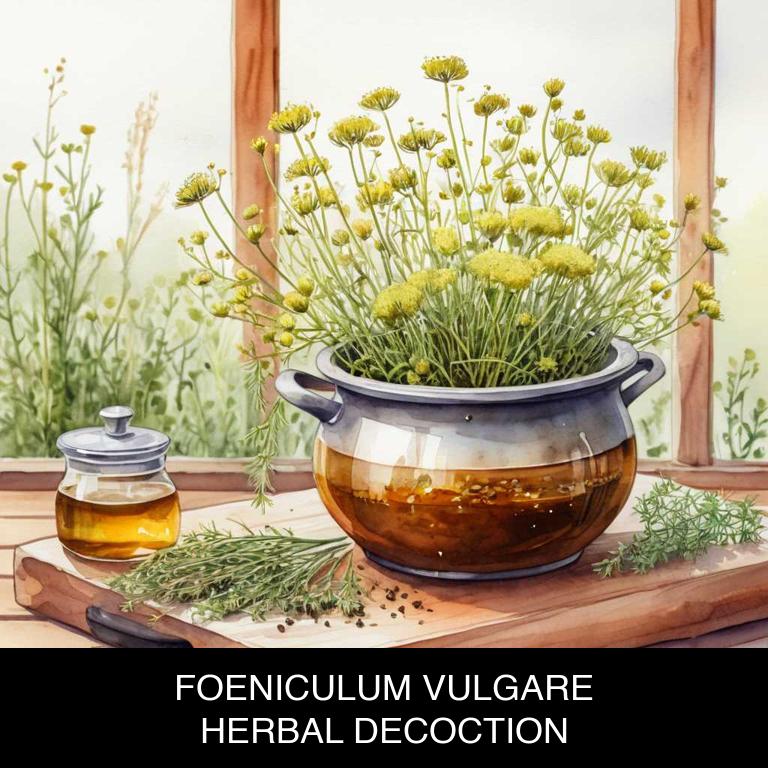
Medicinal Constituents
The list below shows the primary medicinal constituents in Foeniculum vulgare decoctions that help with gas in stomach.
- Furanocoumarins: These compounds, particularly bergapten, have been shown to have carminative properties, helping to reduce gas and alleviate discomfort in the stomach by relaxing the smooth muscles in the digestive tract.
- Terpenes: The terpenes present in Foeniculum vulgare help to reduce inflammation in the stomach, which can contribute to gas buildup, and also have a calming effect on the digestive system, promoting the release of gas.
- Phthalides: Phthalides, particularly falcarinol, have been found to possess anti-inflammatory and antioxidant properties, which can help reduce inflammation and oxidative stress in the stomach, leading to a decrease in gas production.
Parts Used
The list below shows the primary parts of fennel used to make decoctions for gas in stomach.
- Leaves: The leaves are the most commonly used part of Foeniculum vulgare for decoctions to relieve gas in the stomach due to their high content of volatile oils, particularly anethole, which helps to reduce bloating and discomfort.
- Seeds: Foeniculum vulgare seeds are used to make decoctions for gas in the stomach due to their carminative properties, which help to ease digestion and relieve flatulence.
- Fruits: The fruits of Foeniculum vulgare are used to make decoctions for gas in the stomach due to their high concentration of essential oils, which aid in digestion and help to reduce gas and bloating.
Quick Recipe
The following recipe gives a procedure to make a basic fennel for gas in stomach.
- Harvest fresh foeniculum vulgare roots in the summer months when they are most potent and aromatic.
- Chop the harvested roots into small pieces to increase their surface area for infusion.
- Combine 1 tablespoon of chopped foeniculum vulgare roots with 2 cups of boiling water in a saucepan.
- Reduce the heat and simmer the mixture for 5-7 minutes to allow for extraction of active compounds.
- Strain the decoction through a cheesecloth or fine-mesh sieve into a clean container for storage and use.
2. Glycyrrhiza glabra
Licorice decoctions helps with gas in stomach because they soothe the digestive system by reducing inflammation and calming irritation in the gut.
The active compounds present in licorice root, such as glycyrrhizin and flavonoids, have natural anti-inflammatory properties that help to alleviate symptoms of bloating, discomfort, and cramps associated with gas.
Additionally, licorice decoctions also aid in digestion by stimulating gastric juices and increasing the absorption of nutrients, which helps to relieve pressure and discomfort caused by gas buildup in the stomach.

Medicinal Constituents
The list below shows the primary medicinal constituents in Glycyrrhiza glabra decoctions that help with gas in stomach.
- Licoricidin: It acts as an anti-inflammatory and antioxidant, reducing irritation and inflammation in the stomach lining, which can contribute to gas and discomfort.
- Glycyrrhizin: It has anti-inflammatory and anti-irritant properties, which help to soothe the stomach lining, reduce inflammation, and alleviate gas and bloating.
- Flavonoids: They exhibit anti-inflammatory and antioxidant activities, which help to reduce inflammation and oxidative stress in the stomach, alleviating gas and discomfort.
Parts Used
The list below shows the primary parts of licorice used to make decoctions for gas in stomach.
- Roots: They are the primary part used due to their high glycyrrhizin content, which has anti-inflammatory properties and can help alleviate stomach discomfort.
- Leaves: Some traditional practices use leaves as they contain glycosides and flavonoids that may help in soothing stomach issues and reducing gas.
- Seeds: Although less common, seeds are sometimes used in decoctions as they have anti-inflammatory properties and may help in reducing stomach discomfort.
Quick Recipe
The following recipe gives a procedure to make a basic licorice for gas in stomach.
- Harvest 1 to 2 pounds of dried glycyrrhiza glabra roots in the early morning after the dew has evaporated.
- Rinse the roots with cold water to remove any dirt or debris from the harvesting process.
- Chop the roots into small pieces using a sharp knife or root cutter to increase surface area.
- Combine the chopped roots with 2 cups of water in a large pot and bring to a boil over high heat.
- Simmer the decoction for 10 to 15 minutes and then strain it using a cheesecloth or fine-mesh sieve.
3. Carum carvi
Caraway decoctions helps with gas in stomach because it contains a unique blend of antioxidants, anti-inflammatory compounds, and natural carminatives that work together to alleviate digestive discomfort.
The decoction's active ingredients, such as volatile oils and flavonoids, help to relax the muscles in the digestive tract, reducing bloating and cramping caused by gas buildup.
Additionally, caraway's natural properties also stimulate digestion and absorption, allowing for easier passage of gas through the digestive system, providing relief from uncomfortable symptoms.
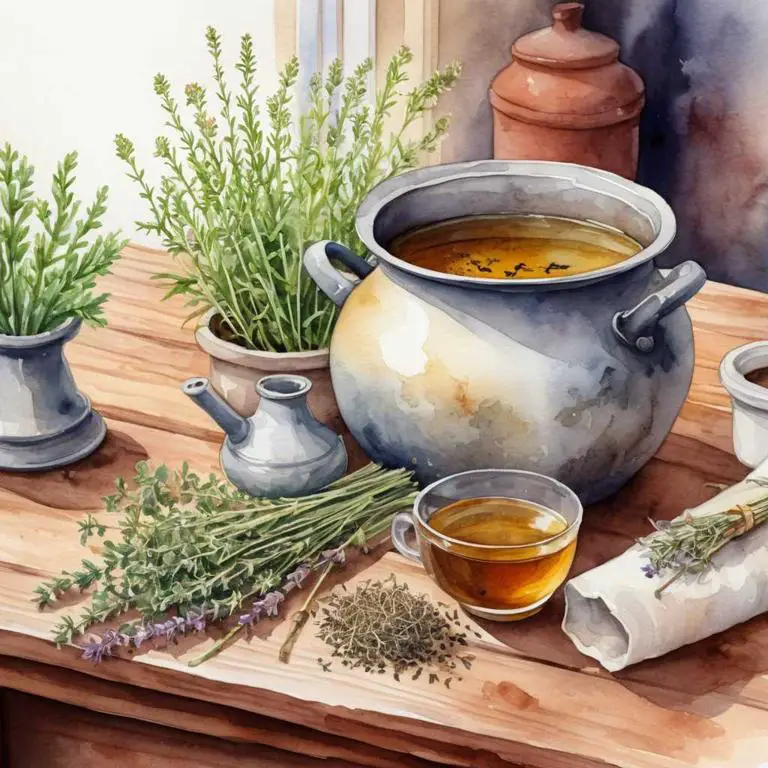
Medicinal Constituents
The list below shows the primary medicinal constituents in Carum carvi decoctions that help with gas in stomach.
- Carvone: It helps with gas in the stomach by relaxing the muscles in the digestive tract, allowing gas to pass through more easily and reducing cramping.
- Limonene: It helps by reducing inflammation and relaxing the muscles in the digestive tract, which can help alleviate gas and discomfort in the stomach.
- Phthalide: It helps by reducing the spasms and contractions in the digestive tract that can cause gas and bloating in the stomach.
Parts Used
The list below shows the primary parts of caraway used to make decoctions for gas in stomach.
- Seeds: They are commonly used to make decoctions due to their carminative properties, which help relieve gas and bloating in the stomach.
- Roots: The roots of Carum carvi contain compounds that have a calming effect on the digestive system, reducing gas and discomfort in the stomach.
- Leaves: The leaves of Carum carvi are also used to make decoctions, as they have anti-inflammatory properties that can help soothe the stomach and alleviate gas.
Quick Recipe
The following recipe gives a procedure to make a basic caraway for gas in stomach.
- Harvest carum carvi roots and seeds in late summer or early fall when they are dry and mature.
- Clean the harvested material thoroughly and chop it into small pieces to ensure even extraction.
- Combine 2 teaspoons of chopped carum carvi with 1 cup of boiling water in a saucepan.
- Reduce heat and simmer the mixture for 10 to 15 minutes to allow for extraction.
- Strain the liquid through a cheesecloth or fine-mesh sieve into a bowl to remove solids.
4. Angelica archangelica
Angelica decoctions helps with gas in stomach because its unique composition of volatile oils, flavonoids, and terpenes exhibits anti-inflammatory and carminative properties.
The decoction soothes the digestive tract, reducing inflammation and discomfort associated with gas buildup. Additionally, angelica's natural antispasmodic effects help relax the muscles in the gastrointestinal tract, allowing for smoother digestion and reduced pressure that can contribute to bloating.
As a result, herbal angelica decoctions provide a natural and effective solution for alleviating gas and promoting overall digestive wellness.
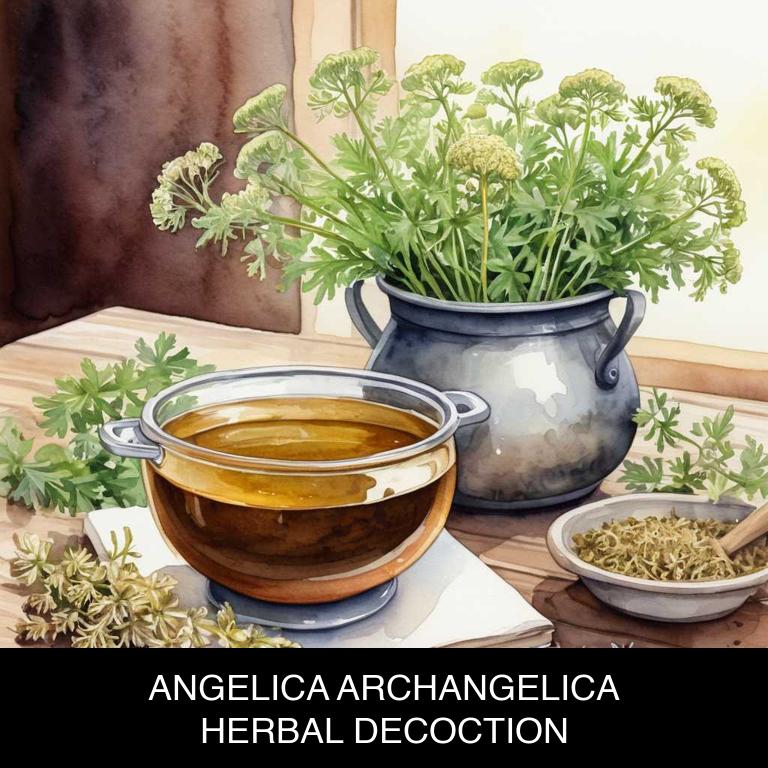
Medicinal Constituents
The list below shows the primary medicinal constituents in Angelica archangelica decoctions that help with gas in stomach.
- Coumarins: Coumarins in Angelica archangelica decoctions help with gas in stomach by inhibiting the growth of bacteria that can cause gas production and alleviate inflammation in the digestive tract.
- Phenolic acids: Phenolic acids, such as ferulic and caffeic acids, have anti-inflammatory and antioxidant properties that help reduce gas and discomfort in the stomach by protecting the mucous membranes from damage and promoting the healing of gastric ulcers.
- Acylphloroglucinols: Acylphloroglucinols in Angelica archangelica decoctions have anti-inflammatory and carminative properties that help alleviate gas and bloating in the stomach by reducing inflammation and relaxing the muscles in the digestive tract.
Parts Used
The list below shows the primary parts of angelica used to make decoctions for gas in stomach.
- Roots: They contain a high concentration of volatile oils and other compounds that help to ease digestive discomfort.
- Leaves: They have a calming effect on the digestive system and can help to reduce inflammation in the stomach.
- Stems: The stem of Angelica archangelica contains similar compounds to the roots, which can help to soothe digestive issues and reduce gas.
Quick Recipe
The following recipe gives a procedure to make a basic angelica for gas in stomach.
- Harvest fresh or dried roots of the angelica archangelica plant in autumn when the plant is mature.
- Dry the harvested roots in a well-ventilated area for 1-2 weeks to reduce moisture content.
- Chop the dried roots into small pieces and weigh out a dosage of 20-30 grams per 1 liter.
- Combine the chopped roots with 1 liter of water in a saucepan and bring to a boil.
- Reduce heat and simmer for 10-15 minutes then strain the liquid and discard the solids.
5. Citrus x limon
Lemon decoctions helps with gas in stomach because it stimulates digestive enzymes, promoting efficient breakdown of food and absorption of nutrients.
The citric acid and flavonoids present in lemons help to relax the muscles in the digestive tract, reducing bloating and cramping caused by trapped gas. Additionally, herbal lemon decoctions have anti-inflammatory properties that soothe the gut lining, further alleviating discomfort and promoting a healthy digestive system.
Regular consumption of these decoctions can lead to improved digestion and reduced symptoms of gas and bloating.
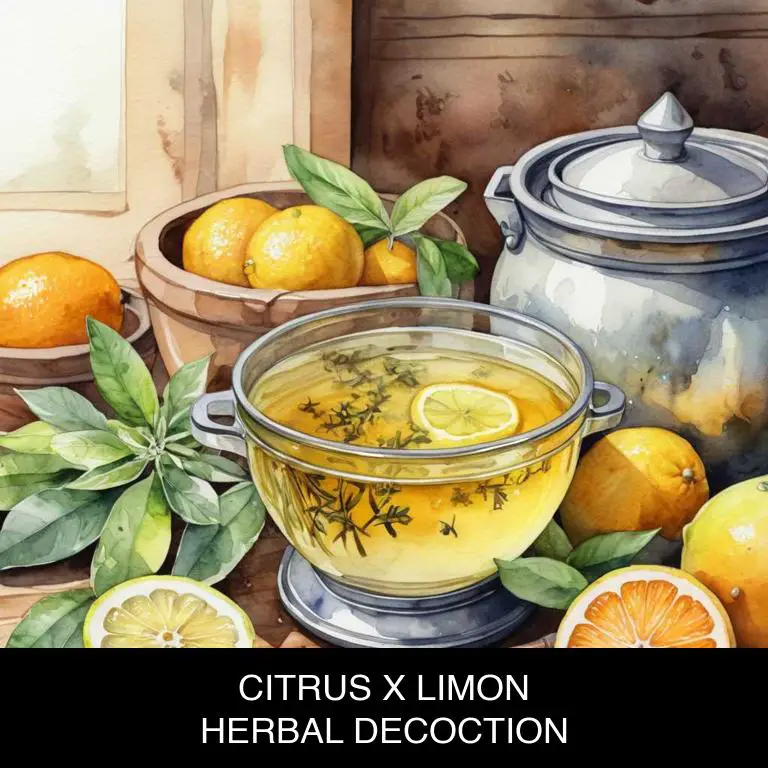
Medicinal Constituents
The list below shows the primary medicinal constituents in Citrus x limon decoctions that help with gas in stomach.
- Citric acid: Helps break down proteins and fats, reducing the formation of gas-producing compounds in the stomach.
- Limonene: Acts as a carminative agent, helping to release trapped gas in the digestive system and alleviate symptoms of bloating and discomfort.
- Naringenin: Exhibits anti-inflammatory properties, which may help soothe the stomach lining and reduce inflammation that can contribute to gas and discomfort.
Parts Used
The list below shows the primary parts of lemon used to make decoctions for gas in stomach.
- Leaves: Lemon leaves are used in decoctions for their antioxidant and anti-inflammatory properties, which help reduce inflammation and ease digestive discomfort associated with gas.
- Seeds: Lemon seeds are occasionally used in decoctions for their carminative properties, which help to release trapped gas and alleviate stomach discomfort.
Quick Recipe
The following recipe gives a procedure to make a basic lemon for gas in stomach.
- Harvest 5-10 fresh citrus x limon peels in the morning after sunrise when the essential oils are most concentrated.
- Dry the peels in a warm place for 2-3 weeks to reduce moisture content to 10% or less.
- Chop the dried peels into small pieces to increase the surface area for infusion.
- Combine 1 tablespoon of chopped peels with 1 quart of water in a saucepan and bring to a boil.
- Simmer the mixture for 10-15 minutes to release the flavors and oils into the water.
6. Silybum marianum
Milk thistle decoctions helps with gas in stomach because it contains silymarin, a flavonoid compound that has anti-inflammatory properties.
When consumed as an herbal tea, milk thistle decoction helps to soothe and calm the digestive tract, reducing inflammation and discomfort caused by trapped air and bloating. Additionally, milk thistle's natural antispasmodic properties help to relax the muscles in the stomach, allowing for smoother digestion and reduced gas buildup.
This results in a more comfortable and relaxed digestive system.
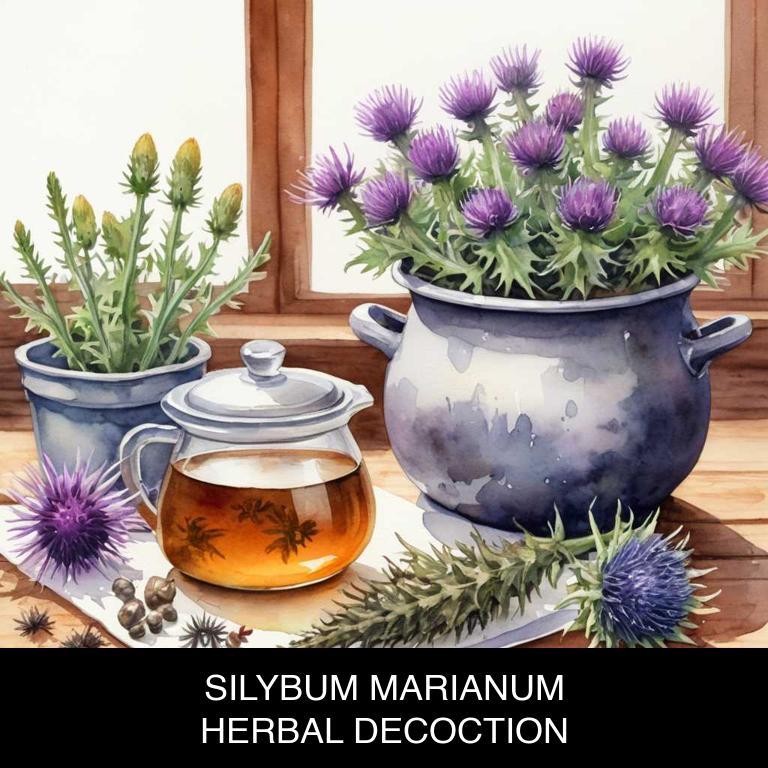
Medicinal Constituents
The list below shows the primary medicinal constituents in Silybum marianum decoctions that help with gas in stomach.
- Silymarin: Silymarin acts as an anti-inflammatory and antioxidant agent, which helps reduce inflammation and alleviate symptoms associated with gas in the stomach.
- Flavonoids: Flavonoids in Silybum marianum decoctions have anti-spasmodic properties, which help relax the muscles in the digestive tract, reducing cramps and discomfort caused by gas in the stomach.
- Fatty acids: Fatty acids present in Silybum marianum decoctions may help soothe the stomach lining, reduce inflammation, and promote the production of digestive enzymes, thereby alleviating gas and bloating in the stomach.
Parts Used
The list below shows the primary parts of milk thistle used to make decoctions for gas in stomach.
- Seeds: They are used because they are rich in silymarin, a compound that helps to reduce inflammation and alleviate digestive issues, including gas and bloating.
- Leaves: They are used because they contain various bioactive compounds, including flavonoids and terpenoids, which have anti-inflammatory and antioxidant properties that can help to soothe digestive issues.
- Flowers: They are used because they contain silymarin and other bioactive compounds that have anti-inflammatory and antioxidant properties, which can help to reduce inflammation and alleviate digestive issues.
Quick Recipe
The following recipe gives a procedure to make a basic milk thistle for gas in stomach.
- Harvest the silybum marianum flowers and seeds from mature plants in the morning after the dew has dried completely.
- Clean and dry the collected silybum marianum flowers and seeds in a warm place for at least 24 hours.
- Combine 20 grams of the dried silybum marianum flowers and seeds with 500 milliliters of water in a saucepan.
- Bring the mixture to a boil then reduce the heat and simmer for 10 to 15 minutes.
- Strain the decoction through a cheesecloth or a fine-mesh sieve into a clean container discard the solids and store the liquid in the refrigerator for up to 3 days.
7. Symphytum officinale
Comfrey decoctions helps with gas in stomach because of its unique ability to soothe and calm the digestive tract.
The herb's high concentration of allantoin and other bioactive compounds has a gentle anti-inflammatory effect, reducing inflammation and irritation in the gut that can lead to bloating and discomfort. Additionally, comfrey's natural demulcent properties form a protective barrier on the mucous membranes, preventing irritants from causing further distress and promoting healthy digestion.
This results in improved digestion, reduced gas and bloating, and a more comfortable stomach overall.
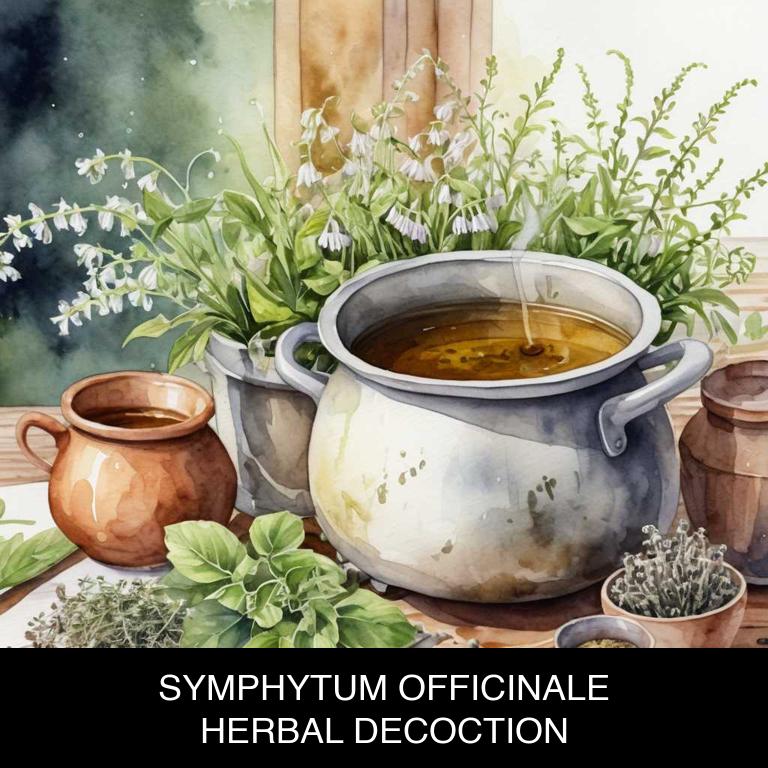
Medicinal Constituents
The list below shows the primary medicinal constituents in Symphytum officinale decoctions that help with gas in stomach.
- Alkaloids: These compounds, specifically including allantoin, have anti-inflammatory properties that can help reduce inflammation in the digestive tract, which can contribute to gas and discomfort.
- Saponins: Saponins in Symphytum officinale have been shown to have a soothing effect on the mucous membranes in the digestive tract, reducing irritation and inflammation that can lead to gas and bloating.
- Tannins: Tannins have astringent properties that can help reduce inflammation and irritation in the digestive tract, which can contribute to gas and discomfort, by contracting the mucous membranes and reducing mucus production.
Parts Used
The list below shows the primary parts of comfrey used to make decoctions for gas in stomach.
- Leaves: Leaves are commonly used due to their high concentration of mucilages that help soothe and calm the digestive system.
- Roots: Roots are widely used due to their rich store of mucilages and other compounds that aid in reducing inflammation and relieving gas in the stomach.
- Stems: Stems are used due to their ability to provide a mild and soothing effect on the digestive system, which helps to ease discomfort caused by gas.
Quick Recipe
The following recipe gives a procedure to make a basic comfrey for gas in stomach.
- Harvest the leaves of the plant in the morning after the dew has dried to ensure maximum potency.
- Dry the harvested leaves in a warm place or using a food dehydrator on a low temperature setting for several hours.
- Grind the dried leaves into a fine powder using a mortar and pestle or a spice grinder at high speed.
- Combine 1 teaspoon of the ground leaves with 1 cup of boiling water in a heat-resistant glass container.
- Steep the mixture for 10 to 15 minutes before straining it with a cheesecloth or a fine mesh sieve.
8. Taraxacum officinale
Dandelion decoctions helps with gas in stomach because of its natural ability to stimulate digestive enzymes, reducing bloating and discomfort.
The decoction's bitter properties help to stimulate the appetite and improve digestion, breaking down food more efficiently and preventing gas buildup.
Additionally, dandelion's anti-inflammatory properties soothe and calm the digestive tract, reducing irritation and inflammation that can contribute to stomach discomfort.

Medicinal Constituents
The list below shows the primary medicinal constituents in Taraxacum officinale decoctions that help with gas in stomach.
- Taraxasterol: It helps with gas in the stomach by reducing inflammation and relaxing the muscles in the digestive tract, thereby alleviating cramps and discomfort associated with gas.
- Luteolin: This flavonoid helps with gas in the stomach by inhibiting the production of gas-producing bacteria in the gut and reducing inflammation, which can help alleviate symptoms of bloating and discomfort.
- Saponins: Saponins in Taraxacum officinale decoctions help with gas in the stomach by reducing the growth of gas-producing bacteria in the gut and improving gut motility, which can help alleviate symptoms of bloating and discomfort.
Parts Used
The list below shows the primary parts of dandelion used to make decoctions for gas in stomach.
- Leaves: They are commonly used due to their high content of essential oils and flavonoids that have anti-inflammatory and carminative properties.
- Roots: The roots are used to make decoctions for their bitter properties, which can stimulate digestion and relieve gas in the stomach.
- Flowers: The flowers are used to make teas that have anti-inflammatory properties and can help soothe digestive issues, including gas and bloating.
Quick Recipe
The following recipe gives a procedure to make a basic dandelion for gas in stomach.
- Harvest 20-30 fresh taraxacum officinale roots and wash them thoroughly with cold running water for 5 minutes.
- Chop the roots into small pieces and combine them with 1 quart of water in a saucepan.
- Bring the mixture to a boil over high heat and then reduce the heat to a simmer for 10 minutes.
- Strain the decoction through a cheesecloth or a fine-mesh sieve into a clean container discarding the solids.
- Allow the decoction to cool to room temperature and store it in the refrigerator for up to 3 days.
9. Aloe vera
Aloe decoctions helps with gas in stomach because it contains anti-inflammatory properties that soothe the digestive tract, reducing inflammation and discomfort caused by bloating.
The gel-like substance present in aloe also has natural lubricating qualities, which can help to ease digestion and reduce symptoms of gas such as cramping and discomfort.
Additionally, aloe decoctions have been shown to inhibit the growth of bacteria that can contribute to gas and indigestion, promoting a healthy gut environment and alleviating digestive issues.
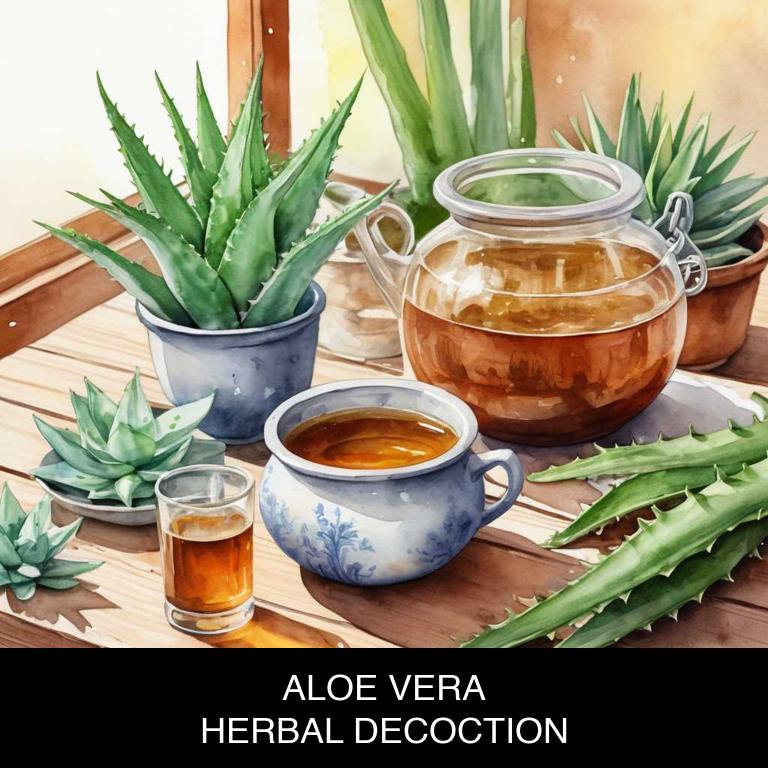
Medicinal Constituents
The list below shows the primary medicinal constituents in Aloe vera decoctions that help with gas in stomach.
- Phenolic acids: Phenolic acids present in Aloe vera, such as gallic acid and vanillic acid, have anti-inflammatory properties that may help alleviate stomach gas and reduce inflammation in the digestive tract.
- Aloe-emodin: Aloe-emodin, a anthraquinone compound found in Aloe vera, has been shown to exhibit anti-inflammatory and antioxidant activities that may help reduce gas and alleviate symptoms of irritable bowel syndrome (IBS).
- Saponins: Saponins present in Aloe vera, such as aloin and aloe-emodin, have been found to have anti-inflammatory and antimicrobial properties that may help soothe the digestive tract, reduce gas, and alleviate symptoms of stomach discomfort.
Parts Used
The list below shows the primary parts of aloe used to make decoctions for gas in stomach.
- Leaves: The leaves are the most commonly used part of Aloe vera to make decoctions for gas in the stomach due to their high gel content, which has anti-inflammatory properties that help soothe digestive issues.
- Stems: The stems of Aloe vera are used to make decoctions for gas in the stomach, as they contain compounds that help relax the muscles in the digestive tract, reducing inflammation and relieving gas and bloating.
Quick Recipe
The following recipe gives a procedure to make a basic aloe for gas in stomach.
- Harvest 5 to 7 aloe vera leaves with thick green skin and store them in a cool dry place for up to 5 days.
- Cut the aloe vera leaves into 1-inch pieces and soak them in cold water for 2 hours.
- Boil 1 quart of water in a saucepan and then add the aloe vera pieces to the boiling water.
- Reduce the heat to low and simmer the aloe vera mixture for 30 minutes to break down the plant's compounds.
- Strain the decoction through a cheesecloth or fine mesh into a clean glass container and store it in the refrigerator for up to 3 days.
10. Curcuma longa
Turmeric decoctions helps with gas in stomach because of its unique compound curcumin, which has natural anti-inflammatory and antioxidant properties.
Curcumin helps to reduce inflammation in the digestive tract, alleviating symptoms such as bloating, cramps, and flatulence. Additionally, turmeric's carminative properties help to expel trapped gases from the digestive system, providing fast relief from discomfort and indigestion.
This natural remedy has been used for centuries to soothe stomach upset and promote overall gut health.
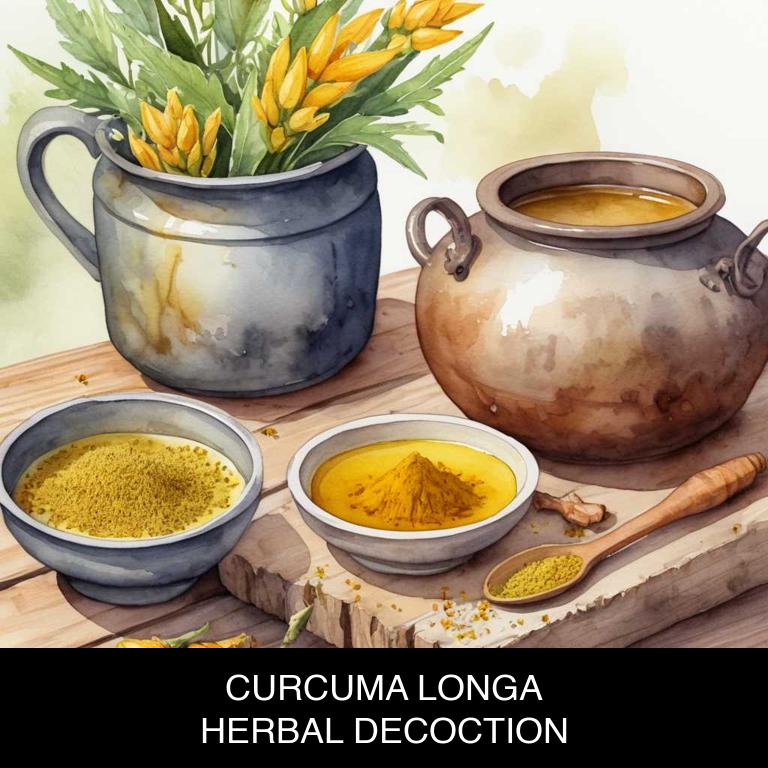
Medicinal Constituents
The list below shows the primary medicinal constituents in Curcuma longa decoctions that help with gas in stomach.
- Curcumin: A polyphenolic compound that helps reduce gas and bloating by inhibiting the production of pro-inflammatory enzymes and cytokines, which contribute to stomach discomfort.
- Volatile oils: Terpenes that help relax the muscles in the digestive tract, reducing spasms and cramps that can cause gas and bloating.
- Demethoxycurcumin: A polyphenolic compound that has anti-inflammatory and antioxidant properties, which can help reduce inflammation and oxidative stress in the digestive tract, alleviating symptoms of gas and bloating.
Parts Used
The list below shows the primary parts of turmeric used to make decoctions for gas in stomach.
- Rhyzomes: Rhyzomes are the most commonly used part due to their high concentration of curcumin, a compound that has anti-inflammatory properties and helps to reduce digestive discomfort.
- Roots: Roots are also frequently used as they contain a high amount of volatile oils and curcumin, which together help to alleviate gas and bloating in the stomach.
- Leaves: Leaves are sometimes used for their diuretic and carminative properties, which can help to relieve gas and promote digestion in the stomach.
Quick Recipe
The following recipe gives a procedure to make a basic turmeric for gas in stomach.
- Wash 1-2 teaspoons of dried curcuma longa powder in a fine-mesh strainer under cold running water for 30 seconds.
- Combine the cleaned curcuma longa powder with 1 cup of water in a medium-sized saucepan.
- Heat the mixture over medium heat, whisking occasionally, for 5-7 minutes or until the powder dissolves.
- Reduce the heat to low and simmer the decoction for 10-15 minutes, stirring occasionally.
- Strain the decoction through a fine-mesh strainer into a cup, discarding the solids.
What is the best combination of herbal decoctions to use for gas in stomach?
The best combination of herbal decoctions that help with gas in stomach is a blend of Peppermint, Ginger, and Fennel.
Peppermint decoction helps to relax the muscles in the digestive tract, reducing inflammation and cramps. Ginger decoction aids in digestion, reducing nausea and bloating. Fennel decoction has natural carminative properties, helping to release trapped gas.
Mixing these decoctions can help alleviate symptoms of gas in the stomach, providing relief from discomfort and pain.
What ailments similar to gas in stomach are treated with herbal decoctions?
Ailments similar to gas in stomach that are treated with herbal decoctions are bloating, indigestion, and irritable bowel syndrome (IBS).
Decoctions made from herbs like fennel, ginger, peppermint, and chamomile help to soothe the digestive system, reduce inflammation, and alleviate symptoms of discomfort, cramping, and flatulence.
These herbal remedies promote relaxation and improve digestion, providing natural relief from various stomach complaints.